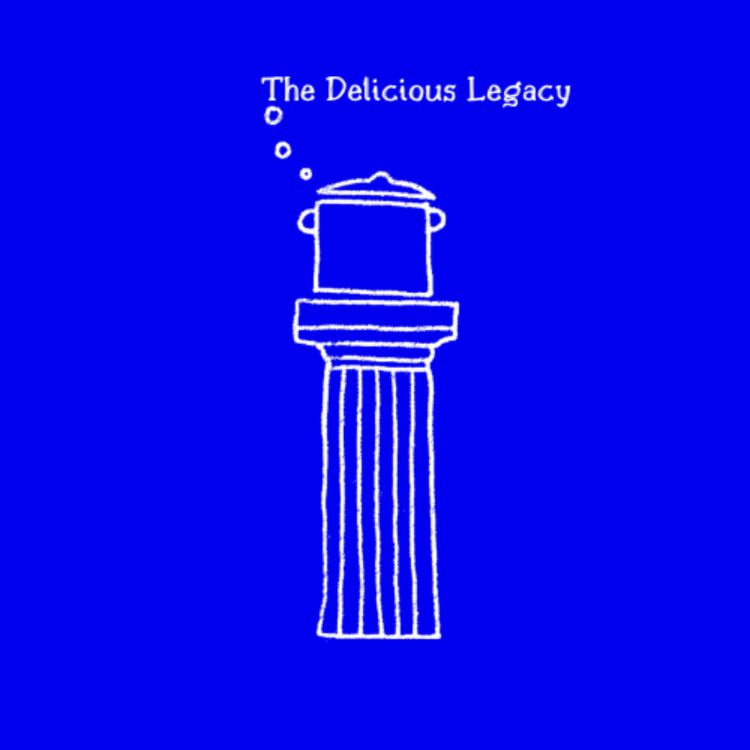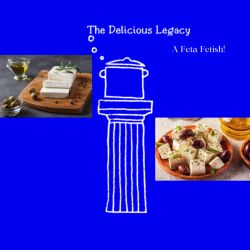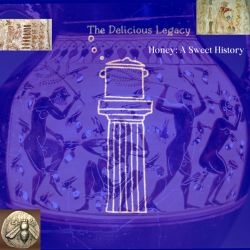Share

The Delicious Legacy
A Short History of Ancient Mesopotamian Food
...Ninkasi, you are the one who pours out the filtered beer of the collector vat,
It is (like) the onrush of the Tigris and the Euphrates.
A brilliant Assyrian hymn to the Goddess of the brewing process Ninkasi. Also a good set of instructions on how to make beer!
Aside from beer, there are many other inventions that Sumerians are credited with. But...
There is not enough time in my lifetime to write everything about Mesopotamian food!
From Sumerians, to Akkadians to Assyrians and Babylonians, we're talking about civilizations and empires that lasted roughly four thousand years!
More time has elapsed from the first cuneiform clay tablet in 3200BCE -when writing was invented- till the last around 1st century AD, than from the last until today!
As you understand it would be impossible to analyse everything for such a rich, diverse and vast region in both historical and cultural artefacts!
So in the 40 minutes that the podcast lasts I hope I covered enough points that will introduce you to the first complex and sophisticated cuisine of mankind! (or at least the first we have some written records about!)
Enjoy!
As you usual, if you want to contribute and help me do this podcast you can support me on Patreon. I have 5 levels of sponsorship
and on the highest one you will have the pleasure of me cooking an ancient 3 course menu for you! So what are you waiting for? Subscribe! :-)
https://www.patreon.com/thedeliciouslegacy
Music by the amazing Pavlos Kapralos!
More episodes
View all episodes

28. A Short History of Ancient Mesopotamian Food (From the archives)
41:45...Ninkasi, you are the one who pours out the filtered beer of the collector vat,It is (like) the onrush of the Tigris and the Euphrates.Hello! The lines above are from a brilliant Assyrian hymn to the Goddess of the brewing process: Ninkasi. Also a good set of instructions on how to make beer!Aside from beer, there are many other inventions that Sumerians are credited with. But there is not enough time in my lifetime to write everything about Mesopotamian food!From Sumerians, to Akkadians to Assyrians and Babylonians, we're talking about civilizations and empires that lasted roughly four thousand years. More time has elapsed from the first cuneiform clay tablet in 3200BCE -when writing was invented- till the last tablet around 1st century AD, than from the last until today. What were their recipes? How do we know? And what about their food production systems and first documented agricultural practises?Enjoy!As you usual, if you want to contribute and help me do this podcast you can support me on Patreon. Music by the amazing Pavlos Kapralos!https://www.youtube.com/channel/UCzgAonk4-uVhXXjKSF-Nz1A
27. The Cuisine of the Black Sea Greeks
30:00Deep in a mountain in the Pontic Alps, North-East Turkey, there's a monastery reminiscent of Tolkien's Minas Tirith; the seven-walled fortress city built on the spur of a mountain. Nestled in a steep cliff at an altitude of about 1,200 metres (3,900 ft) and facing a beautiful wooded mountain valley is Panayia Soumela Greek Orthodox monastery, dedicated to Virgin Mary. This is the heartland of the Pontic Greeks. And my journey today begun from a church with the same name, near my home town of Veria, in Northern Greece, 1800 Km away from Trabzon, deep in a forested mountain on a similar altitude...Hello! The Pontic Greeks lived in the region of northern Turkey roughly in the areas of Trabzon, Samsun and Gerishun, Sinop for about 2 millennia before their forced expulsion and genocide.But their food and culture remains still alive luckily for us, and even their unique Greek language which traces its lineage to ancient Greek!So what did they eat? How they cooked their foods? And how does their cuisine differ from other Greeks, and the similarities with other Black Sea nations around...Some spectacular videos of Panagia Soumela Monastery and countryside in Trabzon region mountains:https://www.youtube.com/watch?v=pQb3UJVvbmMhttps://www.youtube.com/watch?v=ynLcqCxCh0sFor traditional Pontic produce in Greece today go to Thessaloniki and find this guy:http://ragian.gr/index.php?route=information/information&information_id=4Google map link for the Thessaloniki shop:https://maps.app.goo.gl/QJGjFiEBW4YN7W369The farm were they age cheeses in caves, smoke their own meats and produce their pasta:https://maps.app.goo.gl/yVQHg9HVdGDcEyWdAMore information about history and culture of Pontic Greeks:https://pontosworld.com/index.phpAnd the Guardian article that inspired me to do this episode today:https://www.theguardian.com/science/2024/apr/03/endangered-greek-dialect-living-bridge-ancient-world-romeykaWith music from Pavlos KapralosEnjoy!
26. A Feta Fetish: Towards a better feta cheese for all
41:07Hello....!Who hasn't heard of feta cheese among us?Now I'm not saying that you necessary need to like it, but most of us know about this white, tangy & salty Greek cheese served with your Greek salad on your favourite holiday destination.But is the feta cheese we eat a "fait accompli"? (or feta accompli?)What is Sfella or "Feta of the Fire"?On today's episode we look at the facts currently and finds out that this is by far not the truth.A lot of deception happens from the rugged mountains in the north west of Greece till the final product reaches your table in faraway lands...Here's some great PDO fetas and other delicious goat and sheep milk cheeses from Greece.Moiras Cheesemakers Geraki Lakonia: (Μοίρας Τυροκομικά, Γεράκι Λακωνίας) tel: +30 27310-71.378Traditional Cheesemaker Tsatsoulis Levidi Arkadias (Παραδοσιακό Τυροκομείο Τσατσουλή, Λεβίδι Αρκαδίας) www.tsatsoulis.com.gr Goat cheese with character: www.tousias.gr Another great Feta cheese: https://chelmos.gr/https://www.maltbyandgreek.com/chelmos-feta-pdo-4kg-in-100g-slicesThanks for listening!The Delicious Legacy
25. From the archive: Traditional Easter Food in Orthodox Greece
27:44Helloooooo...!Easter in UK and Western Europe (Catholic or otherwise) is nearly upon us!Traditionally the most important celebration of Christianity.On this episode from the archives, from April 2020, I'm re-publishing the episode about Eastern Orthodox Easter where I describe in some general terms what is happening during the Lent and Easter Sunday.As is the most important date of the religious calendar and as such, is celebrated in style!The Lent lasts 40 days and then follows the Holy Week (another lent period) and the the Easter Sunday celebrations!What is tsoureki? What do the Greek eat on Palm Sunday?Do they really paint red the hens eggs? Why?And what is "mageiritsa" that's eaten after the midnight mass on Saturday to Sunday morning?Centre piece of Easter Sunday is a whole spit roast lamb on charcoal, or two (or as is the case with my family 3)...and kokoretsi...If you're nostalgic (as a Greek that's stuck abroad and missing it this year) tempted and hungry do have a listen!Music by Pavlos Kapralos.We will back next week with a new episode...!Much love and happy Easter!The Delicious Legacy
24. The birth of Modern Greek Cuisine
26:18Hello!What is Greek Cuisine today?How do we define the food of the modern Greek nation? Clear and in many ways transparent cuisine.can it be defined from the simplicity and freshness of the ingredients, and her frugal, austere or thrifty nature?Is it just this though?And how Greek is mousaka, a dish that is considered so Greek throughout the world?These and much more, I explore on today's episode on the origins of creation of the modern Greek Cuisine and how this is a problem of definitionfor many national cuisines and the myth that is essential in their story.Enjoy!The Delicious Legacy
23. A History of Food Waste and Preservation
50:46Hello!Today I have the pleasure to interview historian Dr Eleanor Barnett about her new book, "Leftovers".The interview was conducted in January, in anticipation of her new book which is coming out on Thursday 14th of March, as a hardback from Head of Zeus.Preservation of food, and waste management isn't a new problem for our globalized societies. It's part of humankind's story from very early on.On this episode Dr. Eleanor Barnett will talk about the past 600 years -give or take- and what happened in Britain specifically from Tudor era until today- with an eye looking into our future! Why food was wasted in the past? How it was wasted? And what did they do with all the food waste that they created?In times of abundance it's easy to forget how tough can be to feed one's family and self. In the past when harvest failed, prices rose, riots followed; when unscrupulous merchants tried to sell the produce unfairly or abroad, mobs descented and took the wheat or cheese for themselves. Yet now we throw away seemingly an endless supply of perfectly good to eat food. 46% of UK waste is from households and hospitality today. Agriculture and farming for 28%, food processing and manufacturing for 17%, and food distribution for 9%. This equates to 9.5 million tonnes every single year. Globally 14% is lost between harvest and retail, and 11% in households. So let's take a deep dive in the past and find out more!Dr Eleanor Barnett posts on instagram as @historyeats and here's her website:https://www.eleanorbarnett.com/
22. Honey: A sweet history. Food of the Gods, first food of Humankind
47:27Hello!Welcome back to another archaeogastronomical adventure! I think you'll enjoy this one! Sweet and complex and full of myths, legends and symbolism!Honey is a revered food the world over and bees a sacred and important insect.Let's find out about the first ever apiary, the ancient egyptian practises, mesopotamian myths and ancient greek myths of honeybees.Plus why the Romans hated Sardinian honey so much? Enjoyyyy!Thom & The Delicious LegacyMusic by Pavlos Kapralos.
21. Minoan Cuisine: The Foods of Bronze Age Crete
01:13:24Hello!I have a genuinely exciting episode from the archives of The Delicious Legacy! Even though this is a re-run I have added some extra bits on the intro and outro with bonus ancient recipes! And it's massive! Labyrinth, Minotaur, Talos, and many other myths and legends, Gods and kings and pirates and poets! This is the sun-kissed, sea-guarded Crete everybody!I had the great honour to talk with food archaeologist Jerolyn Morrison who is in the island of Crete. For the almost 3 decades now, with teams of dedicated, hard working archaeologists from different fields, she explores and excavates ancient sites all over the island. Jerolyn specialises on findings from the Minoan times, so we are talking really ancient stuff here! Times full of myths and legends!More about how you can get involved you can find here:https://www.minoantastes.com/aboutEnjoy!Thom & The Delicious Legacy
20. A Short History of Pistachio
24:41Hello!Self-Exploding nuts! Now this is fact for the ages! Sadly they haven't been used as a weapon in the ancient past so I can't claim it's known for millennia..But...Pistachios!Evidence so far points to farmers having domesticated the pistachio during the first millennium BCE “somewhere within its wild range,” which spanned southern Central Asia, including Tajikistan, Uzbekistan as well as northern Iran and northern Afghanistan. But how did they spread throughout the world? And where can we find the best tastiest ones?And a little bonus on the history of peanuts, another misunderstood legume which is treated as a nut, or legume!Enjoy!The Delicious Legacy